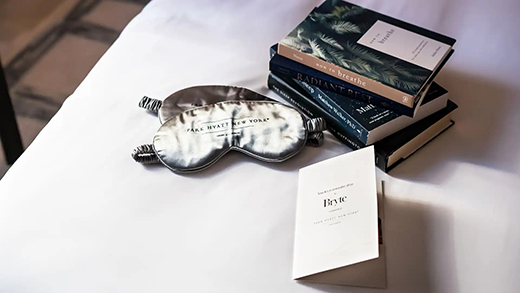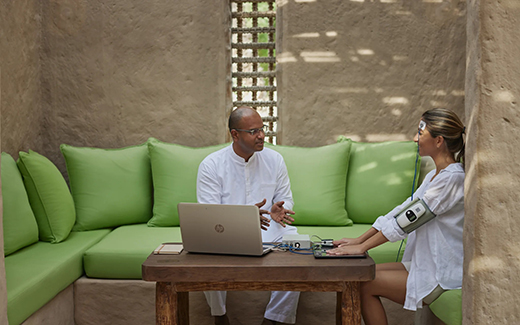Pranjal Shah
17-Sep-2025
As modern life chips away at our sleep, artificial intelligence is stepping in with creative fixes offering personalised pathways back to restorative rest.
The modern lifestyle is infamous for its constant stimulations—from personal demands and familial concerns to workplace pressures. Time, a commodity to be spent prudently, is becoming a luxury, so that, when tired and restless, we find our beds at the end of the day, countless ruminations and ill-expressed worries crowd our attention. Unsurprisingly, lack of quality sleep has become a common complaint, affecting not just mood, focus, and efficiency, but also long-term physical health.
For the average individual, the problem doesn’t always stem from a medical condition; it is often the by-product of subtle habits, environmental triggers, and accumulated stress. Recognising this, several hotels and resorts are now harnessing the power of Artificial Intelligence (AI) to help guests achieve deeper, restorative rest. From AI-driven sleep tracking and smart beds that adjust firmness and temperature to intelligent room systems that personalise lighting, sound, and even aromatherapy, hotels are transforming the sleep experience into something curated and intentional.
What is AI Sleep Tracking?
The use of AI has allowed contemporary sleep technology to evolve beyond simple activity monitoring. Modern wearable devices use multiple sensors, including accelerometers, photoplethysmography (PPG) sensors for heart rate monitoring, and skin temperature sensors to provide comprehensive sleep analysis. These devices track heart rate variability, blood oxygen levels, body temperature fluctuations, and movement patterns to build comprehensive sleep profiles and provide detailed insights into sleep patterns. Additionally, wearable AI technology shows particular promise for detecting and monitoring sleep disorders, with studies demonstrating high accuracy in identifying conditions like sleep apnoea.
AI Sleep Coaching
The availability of detailed, personalised analysis of sleep patterns also increases the possibility of using AI for sleep coaching. For instance, AI sleep coaches can use data from wearable devices and user input to create customised sleep schedules that align with individual circadian rhythms and daily obligations. These systems consider factors such as work schedules, energy levels, and personal preferences to optimise sleep timing. AI can also be used to provide specific recommendations based on our individual lifestyles for improving the sleep environment and modifying behavioural patterns and daily habits for enhancing the quality of sleep.
AI Beds: Hotels Where you can Head to for a Good Night’s Sleep

(Park Hyatt New York, Sleep Suite by Bryte)
The Park Hyatt New York is one of many hotels that has introduced a sleep programme. The sleep suites are in partnership with A.I. mattress startup Bryte. Your suite will include Bryte mattresses that sense and adjust to and relieve the body's pressure points. The mattress also controls the climate and provides sleep statistics and insights that can be accessed on your phone. The suite also includes sleep-enhancing amenities like a Vitruvi essential oils diffuser, Nollapelli Linens, sleeping masks, and a mini library of books that are all about sleep.
The Sleep Lab at Equinox Hotel, New York helps you unlock the next level of rest
with a groundbreaking sleep optimisation experience co-created with world-renowned sleep scientist Dr. Matthew Walker. Your journey begins with Personalized Sleep + Wake Automation—temperature, lighting, sound, and ambiance tuned to your natural rhythm. You sleep on Eight Sleep’s Adaptive Mattress that helps you achieve smarter and deeper sleep. Additionally, you can also indulge in the Contrast Therapy Shower, where steam and ice work in tandem to prepare your body for sleep, as well as PM Rituals and Circadian Colour Meditation to ease stress and induce calm.
Tucked away on the northern tip of Ibiza, Six Senses Ibiza has a special Sleep Wellness program which can be booked for three to seven nights. The sleep progam not only uses AI to track your sleep but also uses other means like private yoga sessions, sound baths, meditation, and biohacking to improve sleep quality. You also get access to sleep tracker data, which can help you understand your sleep patterns.

(Wellness screening at the Six Senses, Ibiza)
Final Words
Modern advancements bring forth new challenges but they also come packed with idiosyncratic solutions. Exposure to blue light, worrisome social media and the fast-paced modern lifestyle may have played a role in disrupting our sleep cycle, but technology and AI have come to the rescue with innovative workarounds. However, despite these attractive answers, wisdom resides in traditional knowledge, and it is advisable to note that these cannot replace the foundations of good sleep hygiene, consistent routines, mindful wind-down practices, balanced lifestyle choices, and, when needed, professional medical guidance.
In the end, the most sustainable path to restorative rest is likely to be a thoughtful balance between modern tools and age-old practices.
Cover Credits: Equinox Hotels